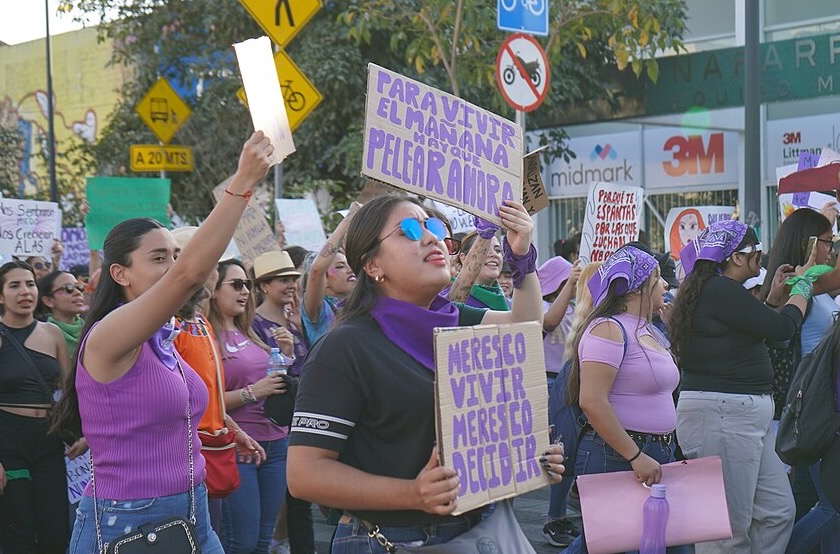The Institute on Gender, Law, and Transformative Peace hosted a regional, cross-national dialogue with grassroots women activist-scholars in Latin America and the Caribbean
BY MARIANA PRANDINI ASSIS AND MIKAELA LUTTRELL-ROWLAND

Banners and slogans in the March 8M 2023 in Guadalajara, Mexico.
Photo Credit: Mtenaespinoza, CC BY-SA 4.0, via Wikimedia Commons
Women’s and feminist movements have long been catalyzing and sustaining forces of processes of resistance and progressive social change in Latin America and the Caribbean. While the region has witnessed some positive developments in terms of democratization, social inclusion, and gender justice throughout the past decades, violence, both from the state and private actors, repression of reproductive and labor rights, securitization, and extractivism continue to be major issues that movements and grassroots organizations confront on a daily basis in their struggles to build more just and peaceful communities. In a political environment that has been growing more and more polarized between the ultra-right and the left, local, activist communities continue to be a fertile ground for transformative and creative responses to those challenges and contribute to subvert and creatively navigate the wide political divides.
This is what the Institute on Gender, Law, and Transformative Peace at City University of New York School of Law learned from an intergenerational group of feminist activist-scholars from across the Americas in late May 2023.[1] Co-facilitated by Institute Senior Director Mikaela Luttrell-Rowland, PhD from CUNY School of Law and Professor Mariana Prandini Assis, PhD at Universidade Federal de Goiás, researchers from Bolivia, Brazil, Canada, Chile, Colombia, Costa Rica, and the United States collectively reflected on urgent and current challenges, and dynamic strategies and insights among those on the front lines of gender justice work across the region.
What types of accountability mechanisms do grassroots activists long to see, and what are some stories heard from the front lines of change and justice? How are these different from the forms of accountability provided by institutional mechanisms, be they state or international? What are some mobilization strategies, including legal but not exclusive to them, being used to address intersectional forms of violence? What have been the accomplishments of these strategies but also the shortcomings?
Reflecting on the past decade on these questions, from a range of different countries and time specific examples, the group discussed both positive developments about local knowledges, and also large setbacks. The group agreed: in examining shared trends in the region, it is necessary to make distinctions and to carefully consider each context.
Some specific insights that arose from the group include the multiple faces of violence as a common problem throughout the region, and the varied ways securitization has come to be seen as a rational political response to it. Indeed, with violence rising as a major problem in the region, securitization has emerged as the immediate and easy response, taken up by both the right and the left. However, these issues emerge and unfold in quite distinct ways in different countries and discussions from the group ranged from both geographic contexts to historical and time specific. Overall, one important theme to emerge was about the ways securitization discourse has been used to justify diverse forms of attacks on human rights and related public policies. The group noted there is a global and indeed hemispheric discourse about securitization and what to do about it that cuts across all political parties, and that requires urgent scrutiny and critical engagement—especially in terms of whose interests are served and for what purpose.
Through the multiple examples from different countries about the wider trend of the turn towards securitization, the group also shared stories and insights of women and their communities across the region who are exercising their resilient and transformative agency. In Bolivia, for example, Indigenous women are reimagining autonomy—bodily autonomy, autonomy from the state, and more—and building caring relationships among people, land and non-humans. In taking time to care for one another and all forms of life, they embrace a wide circle of care. In this way, Bolivian indigenous women fighting against violence and extractivism are also reshaping relationships with time—“slowing down patriarchy”, as activist-scholar Pamela Calla put it. As she pointed, by turning their attention towards care, Indigenous women in these spaces are confronting gender and other forms of violence in a different way, working with men to produce accountability, and supporting one another in localized efforts sustained by collective rights. In doing so, they are creating spaces for connections and potentially to relationships that would otherwise not emerge, expanding their pool of allies and opening the space for difficult but urgent conversations.
The workshop served as an important convening for discussions of comparative challenges happening across the region, but also a reminder of the knowledges and expertise of those on the front lines of gender justice work, who are engaged in everyday resistance on the ground. Through their practices, these women and organizers not only produce crucial knowledge about our common world, but also seek to inform the public discourse and policy responses to urgent challenges of our time.
[1] The participants of the workshop were Camila Paez-Bernal, Cecilia MacDowell Santos, Hillary Hiner, Julia Zulver, Lelya Troncoso, Lieta Vivaldi, Lynn M. Stephen, Mariana Prandini Assis, Mikaela Luttrell-Rowland, Montserrat Sagot, Pamela Calla and Patricia Zavella.
